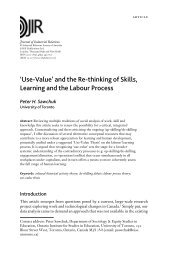The Ontario Curriculum, Grades 9-12 - Ministère de l'éducation ...
The Ontario Curriculum, Grades 9-12 - Ministère de l'éducation ...
The Ontario Curriculum, Grades 9-12 - Ministère de l'éducation ...
You also want an ePaper? Increase the reach of your titles
YUMPU automatically turns print PDFs into web optimized ePapers that Google loves.
Science, Gra<strong>de</strong> 10, Aca<strong>de</strong>mic (SNC2D)<br />
A. Scientific Investigation Skills and Career Exploration<br />
A2. Career Exploration<br />
A2.1 i<strong>de</strong>ntify and <strong>de</strong>scribe a variety of careers related to the fields of science un<strong>de</strong>r study (e.g.,<br />
meteorologist, medical illustrator, geochemist, optical physicist) and the education and<br />
training necessary for these careers<br />
A2.2 i<strong>de</strong>ntify scientists, including Canadians (e.g., Sheela Basrur, William Richard Peltier,<br />
Alice Wilson, Willard Doyle), who have ma<strong>de</strong> a contribution to the fields of science<br />
un<strong>de</strong>r study<br />
C. Chemistry: Chemical Reactions<br />
C1. Relating Science to Technology, Society, and the Environment<br />
C1. analyse a variety of safety and environmental issues associated with chemical reactions,<br />
including the ways in which chemical reactions can be applied to address environmental<br />
challenges<br />
C1.1 analyse, on the basis of research, various safety and environmental issues associated with<br />
chemical reactions and their reactants and/or product(s) (e.g., chemical reactions related<br />
to the use of cyani<strong>de</strong> in gold mining, the corrosion of metal supports on bridges, the use<br />
of different antibacterial agents such as chlorine and bromine in recreational pools) [IP,<br />
PR, AI, C]<br />
Sample questions: Why is it important to un<strong>de</strong>rstand the chemical composition of<br />
chlorinating agents used in swimming pools before using them? What chemical reactions<br />
result in acid precipitation? What impact does it have on the environment? What sources<br />
of information are available on the safety or environmental implications of chemicals and<br />
chemical reactions? Why is it important to ensure that these sources are up to date? Why<br />
is it important to un<strong>de</strong>rstand WHMIS information, including Material Safety Data Sheets,<br />
before using any chemicals?<br />
C1.2 analyse how an un<strong>de</strong>rstanding of the properties of chemical substances and their reactions<br />
can be applied to solve environmental challenges (e.g., renewing the Great Lakes,<br />
neutralizing acid spills, scrubbing smokestack emissions) [AI, C]<br />
Sample issue: Spills from oil tankers damage the environment by contaminating water<br />
and shorelines, killing birds and aquatic life. Biological oil agents help break down the oil<br />
so it <strong>de</strong>gra<strong>de</strong>s faster and does less damage to the environment.<br />
Sample questions: How does the addition of lime reduce the acidification of water? How<br />
can this reaction be applied to renew lakes that have been affected by acid precipitation?<br />
Why is acid leaching used in soil contaminated with heavy metals?<br />
D. Earth and Space Science: Climate Change<br />
D1. Relating Science to Technology, Society, and the Environment<br />
D1. analyse some of the effects of climate change around the world, and assess the<br />
effectiveness of initiatives that attempt to address the issue of climate change<br />
Science 105

















